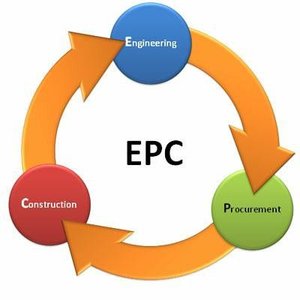What is the full form of EPC
EPC: Engineering, Procurement and Construction
EPC stands for Engineering, Procurement and Construction. It is a common form of contract in the construction industry. The contract is made between the contractor and the client. It covers all the details about the construction project, like the design of the project, procurement of materials and the labour and equipment required for the project. It also includes the project deadlines and the amount to be paid to the contractor.

The client and the contractor should discuss each and every point in detail to avoid confusion and mismatch from the requirement of the client.
Once the contract is made, it is the responsibility of the contractor to keep the expenses within budget and complete the project within the specified timeframe. The agreement in which it is the responsibility of the EPC contractor to complete the project within the given time and budget is commonly known as a Lump Sum Turn Key (LSTK) Contract.
Some Successful EPC Projects
- Diavik Diamond Project
- Mt. Milligan Copper-Gold Project
- Solar Power Project: Solar plant built on the roof-top of a Hospital in Indore, MP.
Top EPC companies in India
- Larsen & Toubro
- Nagarjuna Construction Company
- Punj Lloyd
- IVRCL
- Tata Projects
- Hindustan Construction Company
- Gammon India
- JP Associates
Essential Components of an EPC Contract
These are a few essential components of a solid EPC contract:
- The scope of the work should be specifically stated in an effective EPC contract, together with the project's goals, deadlines, deliverables, and any pertinent technical requirements.
- Cost breakdown, payment conditions, and any fines or rewards for achieving project milestones should all be included in the contract.
- Risk Distribution: The EPC contract should specify exactly how the parties respectively share the risks. This entails locating and mitigating possible risks, including delays, budget overruns, and other unanticipated events.
- Quality Control: A successful EPC contract should impose tight quality control standards and processes on the contractor, as well as monitor and report on project compliance and progress.
- Contracts should clearly outline how modifications to the project scope or timeframe will be managed, including how they will be communicated, considered, and authorised.
- Performance Guarantees: The EPC contract must include performance guarantees, such as warranties or guarantees of the installed equipment or systems, as well as any promises pertaining to the project's overall performance.
- Conflict Resolution: The contract should specify how disagreements between the parties will be settled, whether by mediation, arbitration, or other channels of law.
A good EPC contract should, in general, be thorough, transparent, and equitable, describing the obligations and expectations of all parties involved and offering a framework for successful project completion.
Basic guidelines for drafting the contract's scope
- The business to be conducted should be taken into consideration while drafting the contract.
- The contract's scope shouldn't be unclear.
- The contract's scope should be carefully prepared, with all pertinent references and deadlines for all the key tasks that the parties will need to complete.
- When there are two or more contractors working on the project, the scope matrix should clearly describe the division of work with specified activities and amounts without any overlaps or gaps. The take-off points and/or scope constraints must always be mentioned.
- The contract's scope shouldn't be overly intricate or sophisticated.
The Cost of an EPC Contract
The cost of the project, including a breakdown of costs for engineering, procurement, and construction operations, is often outlined in the price schedule of an EPC (Engineering, Procurement, and Construction) contract. Creating a pricing plan for an EPC contract requires taking into account the following factors:
- Unit Price vs Lump-sum: The pricing schedule may be based on unit prices or lump sums. A unit pricing contract offers a cost per completed item of work, whereas a lump sum contract offers a predetermined fee for the full project.
- Cost Breakdown: A complete breakdown of all project costs, including design and engineering fees, material and equipment prices, labour costs, and any other costs associated with the project, should be included in the pricing schedule.
- Payment Conditions: The payment conditions, such as the payment schedule, the manner of payment, and any rewards or penalties for completing or failing to fulfil project milestones, should be clearly stated.
- Contingency Allowance: To account for unanticipated costs or modifications to the project's scope, the pricing schedule should contain a contingency allowance. This amount is generally 10% of the project cost.
- Escalation Clause: The pricing schedule may contain an escalation clause to take into account inflation or changes in market circumstances that might eventually raise the cost of labour or materials.
- Change Orders: The pricing schedule ought to cover any change orders that could result from modifications to the project's scope, timeline, or requirements. How change orders will be handled, including how costs will be assessed and authorised, should be specified in the schedule.
- Performance Bonds: To guarantee that the project is finished in accordance with specifications and under budget, the pricing schedule may call for the contractor to give performance bonds or other types of financial assurance.
|

 For Videos Join Our Youtube Channel: Join Now
For Videos Join Our Youtube Channel: Join Now










